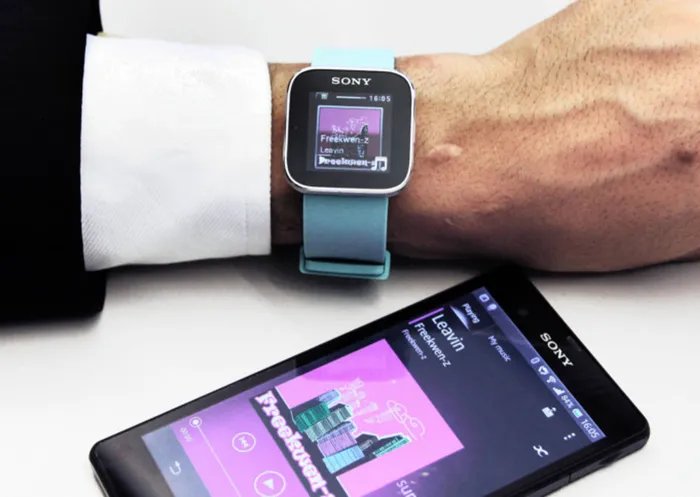Samsung unveils smartwatch today

A Sony Mobile Communications Inc. SmartWatch MN2, top, is displayed with the company's Xperia smartphone at the Sony Corp. headquarters in Tokyo, Japan, on Monday, April 15, 2013. Priced at $130, Sony's 1.3-inch (3.3-centimeter) touchscreen watch wirelessly connects to Android smartphones using Bluetooth technology. The gadget alerts users to calls and allows them to reply to e-mails or texts with an array of pre-written messages. Photographer: Koichi Kamoshida/Bloomberg A Sony Mobile Communications Inc. SmartWatch MN2, top, is displayed with the company's Xperia smartphone at the Sony Corp. headquarters in Tokyo, Japan, on Monday, April 15, 2013. Priced at $130, Sony's 1.3-inch (3.3-centimeter) touchscreen watch wirelessly connects to Android smartphones using Bluetooth technology. The gadget alerts users to calls and allows them to reply to e-mails or texts with an array of pre-written messages. Photographer: Koichi Kamoshida/Bloomberg
Singapore - The smartwatch – an intelligent device on our wrist that connects our bodies to data and us to the world – could be as revolutionary as the smartphone, but only a handful of companies have the heft and vision to be able to pull it off.
Samsung Electronics has another go today when it launches the Galaxy Gear in Berlin, but a source said the device would be no game changer. It would be more of a fashion accessory than a bid to redefine the genre.
Sony is also launching a modest update of its Android-compatible SmartWatch, while heavyweights Apple and Google have shown signs of interest in developing such technology.
Cheerleaders say the potential is vast. The market for wearable devices such as smartwatches and digital eyewear could be $50 billion (R511bn) by 2017, according to Credit Suisse.
Andrew Sheehy, the chief analyst at British-based consultancy Generator Research, points to the awkwardness with which most of us remove a handset from our pockets or handbags and clasp it to our ear. “If you look at the phone today, it’s important to ask: is this as good as it gets?”
Wearable devices, the argument goes, could take over many of the more cumbersome functions of a smartphone while adding functions we can so far only dream of.
But wearables have remained a niche for early adopters, such as fans of Pebble Technology’s crowd-funded smartwatch, which has sold 100 000 units since its launch earlier this year, or health and fitness enthusiasts embracing Nike’s Fuelband or Under Armour’s FitBit.
And therein lies the rub, says Sheehy. “This is tough technology. The companies who can do this are very few and far between.”
First, technological hurdles remain, such as powering the devices. Batteries will need to be between five and 10 times smaller than those in smartphones, says Cosmin Laslau, an analyst at Lux Research.
This needs innovation in materials such as silicon anodes and packaging. Apple is working on flexible batteries.
Then there is a need for better displays. Both Apple and Samsung are working on curved glass. This year Samsung is investing more than $6bn on displays and it plans to launch a curved mobile device later this year, a source says.
And wearing a device is not quite the same as carrying one. For one thing it has to be stylish and consumers need to develop a more personal relationship with a wearable device than a handheld one.
Even if those hurdles are overcome, just how useful is a wearable device going to be?
Right now the most appealing prospects are as a “slave” to the smartphone or tablet, where the wearable device collects data from the user’s body or environment and relays it to the smartphone. The phone acts as a gateway to the internet to process this information and merge it with other data before feeding it back to the device.
“The data created… needs to be made compelling and useful,” Shane Walker, an analyst at IHS, says.
So whoever cracks the nut of a mass-market wearable device is less likely to be a pure hardware maker than a broader-based company.
“You can call me a smartwatch sceptic,” says Sarah Rotman Epps, an analyst at Forrester. “I don’t see that any vendor, with the possible exception of Apple, can make a smartwatch.” – Reuters